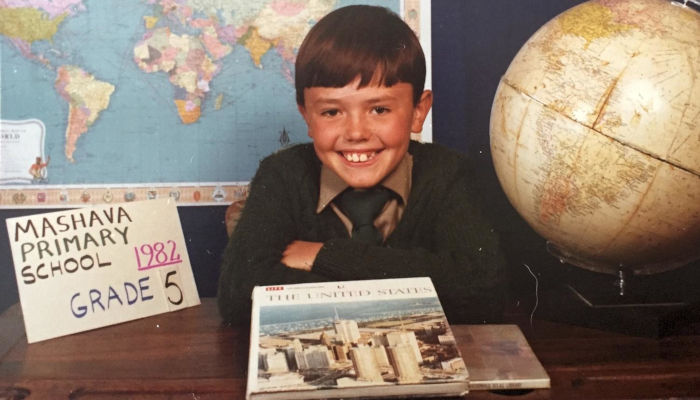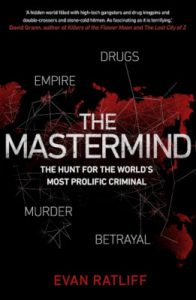‘Paul Le Roux was a sweet kid’ – Read an excerpt from The Mastermind – the true story of the brilliant international crime boss from Krugersdorp
More about the book!

Read an excerpt from The Mastermind – the incredible true story of Paul Le Roux, the coder from Krugersdorp who became an international crime boss.
 Le Roux became one of the world’s most prolific criminals, and the embodiment of a new generation of internet-enabled kingpins. In The Mastermind Evan Ratliff documents the US government’s clandestine efforts to bring him down.
Le Roux became one of the world’s most prolific criminals, and the embodiment of a new generation of internet-enabled kingpins. In The Mastermind Evan Ratliff documents the US government’s clandestine efforts to bring him down.
Read the excerpt:
~~~
Everyone says that Paul Le Roux was a sweet kid. ‘Paulie was an utter delight as a baby and child and young man,’ a relative from his extended family recalled. ‘He was easygoing, a pure delight, happy, uncomplaining, undemanding, loving and affectionate. He really was. I never knew what evil lay in him.’
He was born on Christmas Eve, 1972, at Lady Rodwell Maternity Home in Bulawayo, in the country then called Rhodesia. His mother, Jill, was seventeen and had already decided to give him up for adoption. ‘You’ve disgraced your family, this cannot happen,’ her mother told her, according to one of Le Roux’s half-siblings, born to Jill years later. The family was religious, and had little money. According to Le Roux family lore, the father was a soldier from South Africa who’d travelled to Rhodesia to fight the war. Other family members recalled instead that Le Roux’s father was Zimbabwean—and married—and had left for South Africa later. Either way, Le Roux was born in a time when the shadow of violence had unmoored communities. ‘Life was lived in the moment,’ the relative said. Laws guarded the privacy of mothers who gave children up for adoption, allowing hospitals to issue short-form birth certificates containing only the adoptive parents’ names. The ‘long certificate,’ containing the birth parents’ information, was filed away and meant to be kept confidential. On Le Roux’s long certificate, his first name was listed as ‘UNKNOWN.’ A month after the birth, an official addendum was added: ‘Child to be known in future as: Paul Calder Le Roux.’
His adoptive parents, Paul Sr and Judy Le Roux, had been unable to conceive. They had spent six years on adoption lists, enduring endless rounds of background investigations, requests for character references, visits from the welfare department. When Judy called family members to say that a baby boy had finally arrived for them, she was so overcome with emotion that her grandmother at first thought someone had died. They resolved not to tell the younger Paul that he had been adopted.
The war finally sputtered to an end in 1980, and elections brought Robert Mugabe to power as prime minister of the new Zimbabwe. Le Roux’s parents sent him away to boarding school for sixth and seventh grade, fearing the local education wasn’t intensive enough for their precocious son. On weekends he would rotate between family members’ homes. ‘He was fought over, everyone wanted him,’ the relative said. ‘Our grandparents worshipped the ground he walked on, honestly. I know this sounds like a fairy tale, but it’s true.’ But Judy and Paul Sr decided that they hadn’t had kids in order never to see them, so they decided to relocate to South Africa in search of better schools. Krugersdorp, their new home forty kilometres outside of Johannesburg, was also a mining town, gold instead of asbestos. Life there was different, though. Paul Sr was no longer a manager but a newcomer looking to establish his business.
The younger Paul Le Roux had grown tall, trim, and handsome in his teenage years. A decent but unmotivated student, he despised the idea of learning Afrikaans, compulsory in South African schools. He was not without friends, but projected an air of superiority that increased as he grew older. He derided the new countrymen at his high school as ‘halfwits and morons.’ In a sports-mad culture where a kid of his size was expected on the rugby pitch, he favoured video games played on a console hooked up to the family TV.
When he was sixteen, in an incident he would later recount to employees, the local police raided the Le Roux home and arrested young Paul for selling pornography. The family was scandalized, but managed to keep the story private. ‘He thought it was the funniest thing,’ the female relative said. ‘He said quite openly that he’d found a gap to make money. He argued that if he was selling bibles, curtaining, or study books no one would give a damn. It was a moneymaking business and he didn’t care what the commodity was. That’s where it all started.’
By then, Le Roux had lost interest in any conventional path: graduation, college. He dropped out of high school to follow his interest in computers, and took a programming course at a local college. He completed a year’s worth of course material in eight weeks and picked up programming certificates from three separate training courses over a single year. Not long after, an eighteen-year-old Le Roux would buy a ticket to London, leaving home and striking out on his own with only his self-taught technical prowess as a calling card. At the airport, his cousin recalled, his bags proved too heavy to check. He ditched his clothes and boarded the plane with a suitcase full of programming books.
These were the first steps along the road to becoming a man who would single-handedly build a dystopian company to rival today’s tech giants. Through his creation, an online startup selling hundreds of millions of dollars’ worth of pills to American customers, he would become one of the largest individual contributors to America’s burgeoning painkiller epidemic, and the most successful cyber-criminal in history. He would leverage that fortune into a sprawling criminal empire, fulfilling his seemingly insatiable appetite for the clandestine and the illegal. His ambition for wealth and power would slip the bonds of the Internet and entered the realm of flesh and blood. ‘The scope of his criminal conduct,’ as one US federal prosecutor later put it, ‘is simply staggering.’
In the adjacent world he came to occupy, everything was for sale if you knew what to offer and to whom. Pure methamphetamine manufactured in North Korea. Yachts built to outrun any Coast Guard. Police protection and judges’ favour. Crates of military-grade weapons. Private jets full of gold. Missile-guidance systems. Unbreakable encryption. African militias. Explosives. Kidnapping. Torture. Murder. Former soldiers from the United States, United Kingdom, and elsewhere drifting in the murky realm of global security contracting, could reinvent themselves as roving assassins for hire. Call centre managers in Tel Aviv could wake up and find themselves arms dealers. Family doctors could turn into conspirators in an international drug cartel at the click of a button.
That world lurks just outside of our everyday perception, in the dark corners of the Internet we never visit, the quiet ports where ships slip in by night, the back room of the clinic down the street. Occasionally, I discovered, the edges of that world crossed over into our own. And I came to understand how ordinary people could take one morally ambiguous step across that divide, then a second and a third, until suddenly cops or killers were at their door.
~~~
Categories International Non-fiction South Africa South African Current Affairs
Tags Book excerpts Book extracts Paul Le Roux Penguin Random House SA The Mastermind
